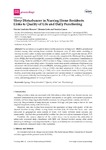Mostrar o rexistro simple do ítem
Sleep Disturbances in Nursing Home Residents: Links to Quality of Life and Daily Functioning
| dc.contributor.author | Concheiro-Moscoso, Patricia | |
| dc.contributor.author | Groba, Betania | |
| dc.contributor.author | Canosa, Nereida | |
| dc.date.accessioned | 2019-10-22T12:00:22Z | |
| dc.date.available | 2019-10-22T12:00:22Z | |
| dc.date.issued | 2019-07-29 | |
| dc.identifier.citation | Concheiro-Moscoso, P.; Groba, B.; Canosa, N. Sleep Disturbances in Nursing Home Residents: Links to Quality of Life and Daily Functioning. Proceedings 2019, 21, 12. https://doi.org/10.3390/proceedings2019021012 | es_ES |
| dc.identifier.issn | 2504-3900 | |
| dc.identifier.uri | http://hdl.handle.net/2183/24172 | |
| dc.description.abstract | [Abstract] The current study sought to determine the association of sleep with HRQOL and physical function among older nursing home residents. Participants were 37 older adults attending or residing in a semi-urban nursing-home facility in Galicia, Spain (70.3% cognitively normal, 29.7% cognitively impaired, aged 84.1±8.0, 81.1% women) who completed the Pittsburgh Sleep Quality Index (PSQI), the 5-level EuroQol-5D, a measure of HRQOL, and the International Classification of Functioning, Disability and Health (ICF) Core Sets for Sleep, a measure of physical functional. After adjustment for age, poor (PSQI score ≤ 14) and/or worse sleep quality (continuous PSQI score) was associated with several indices of lower HRQOL, including greater immobility (b = 0.19, p = 0.012) difficulty completing self-care (b = 0.23, p < 0.001) and daily activities (b = 0.18, p = 0.004), more severe anxiety/depression (b = 0.10, p = 0.042), and a lower overall health index (b = 0.06, p = 0.001). Further, poor/worse sleep quality was associated with several indices of functional impairment, including greater difficulty maintaining body position (b = 0.32, p = 0.004), walking (b = 0.17, p = 0.001), and moving around (b = 0.45, p = 0.009). | es_ES |
| dc.description.sponsorship | GERIA-TIC Project, Project co-funded by the Galician Innovation Agency (GAIN) through the Connect PEME Program (3rd edition) (IN852A 2016/10) and EU FEDER funds, Collaborative Genomic Data Integration Project (CICLOGEN). Data mining and molecular docking techniques for integrative data analysis in colon cancer. “Funded by the Ministry of Economy, Industry and Competitiveness. Galician Network of Research in Colorectal Cancer (REGICC) ED431D 2017/23, Galician Network of Medicines (REGID) ED431D 2017/16 funded by the Department of Culture Education and University Planning aids for the consolidation and structuring of competitive research units of the University System of Galicia of the Xunta de Galicia and Singular Centers (ED431G/01) endowed with FEDER funds of the EU | |
| dc.language.iso | eng | es_ES |
| dc.publisher | MDPI | es_ES |
| dc.relation | info:eu-repo/grantAgreement/Xunta de Galicia/2016/IN852A 2016%10/ES-GA | |
| dc.relation | info:eu-repo/grantAgreement/Xunta de Galicia/2017/ED431D 2017%23/ES-GA | |
| dc.relation | info:eu-repo/grantAgreement/Xunta de Galicia/2017/ED431D 2017%16/ES-GA | |
| dc.relation | info:eu-repo/grantAgreement/Xunta de Galicia/2016/ED431G%01/ES-GA | |
| dc.relation.uri | https://doi.org/10.3390/proceedings2019021012 | es_ES |
| dc.rights | Atribución 4.0 (CC BY) | es_ES |
| dc.rights.uri | https://creativecommons.org/licenses/by/4.0/ | * |
| dc.subject | Ageing | es_ES |
| dc.subject | Sleep disorders | es_ES |
| dc.subject | Quality of life | es_ES |
| dc.subject | Functioning | es_ES |
| dc.title | Sleep Disturbances in Nursing Home Residents: Links to Quality of Life and Daily Functioning | es_ES |
| dc.type | info:eu-repo/semantics/conferenceObject | es_ES |
| dc.rights.access | info:eu-repo/semantics/openAccess | es_ES |
| UDC.journalTitle | Proceedings | es_ES |
| UDC.volume | 21 | es_ES |
| UDC.issue | 1 | es_ES |
| UDC.startPage | 12 | es_ES |
| UDC.conferenceTitle | 2nd XoveTIC Conference | es_ES |






